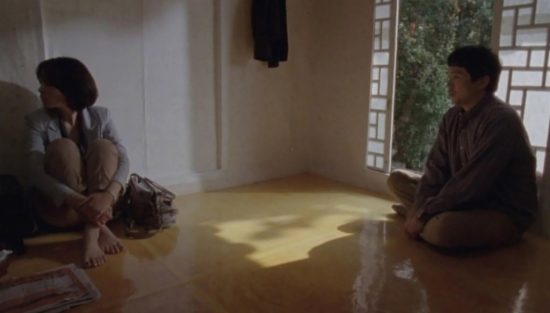
By Blue Un-Sok Kim
The city of Gyeongju holds a special place in the collective psyche of the Korean people. As the former capital of the ancient Korean kingdom of Silla, the city is referred to as a «museum without walls». Unlike most historical treasures of Korea that faced destruction during its turbulent history, the millennia-old treasures of Gyeongju are in plain view for all to see. The ancient royal tombs that dot its modern streets symbolize the tradition and history of a monolithic people. Furthermore, Gyeongju features numerous hills that are vestiges from the Taebaek mountain range, the proverbial «backbone» of Korea that runs along its eastern coast.
And against this backdrop of monolithic tradition and culture, Early Spring, Gyeongju, female director Park In-kyong‘s feature debut, tells the story of a downtrodden young recent divorcee named Hee-myeong. The massive failure of her ex-husband’s ill-conceived business venture, which had been backed by her father, has led to her father’s death. And Hee-myeong comes home from Seoul to Gyeongju to attend her father’s funeral as well as to reassess her life which is now in shambles. Her ex-husband Jun-ho follows her, desperately asking her for reconciliation.
In his pathetic ramblings, he mentions their old mutual female friend Myeong-ju who now resides in Prague. After a while, the audience realizes that it wasn’t necessarily Jun-ho’s business failure that led to the divorce and that there was a more fundamental issue that intimately involves the expat Myeong-ju.
In order to illustrate Hee-myeong’s dilemma, Park shows her navigating the numerous hills and the ancient sites. It is as if Hee-myeong is trekking through a map of the once intensely tradition-bound country’s collective history. For a neophyte filmmaker, Park displays confidence in her camerawork, appropriately using slow panning shots and long takes to convey the depths of Hee-myeong’s emotions.
Many films put protagonists in a quandary that results from the conflict between collective traditions and individual freedom. Park’s choice to present this conflict in what is a modern city with remarkably well-preserved historical treasures may seem an obvious one. But her film’s subtle twists and turns are anything but obvious and manage to captivate as do the turns and twists of Gyeongju’s well-adorned hills.
Director: Park In-Kyeong
Screenplay: Park In-kyeong
Cinematography: Kim Young-chel
South Korea, Czech Republic
55 min
Korean Film Competition